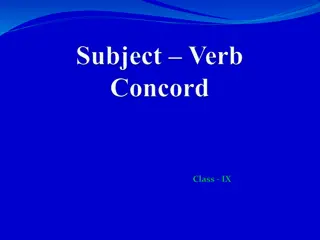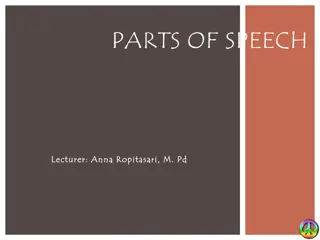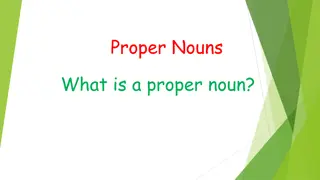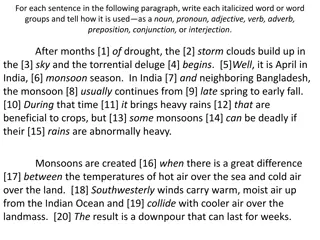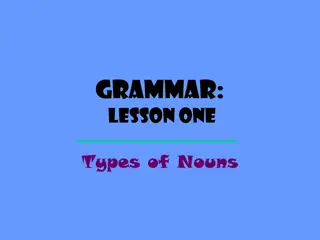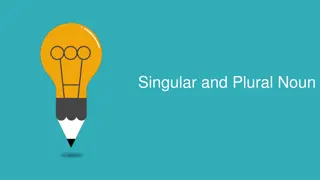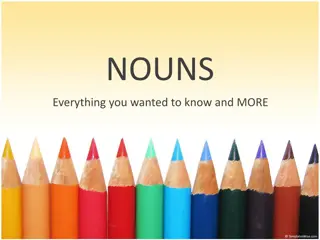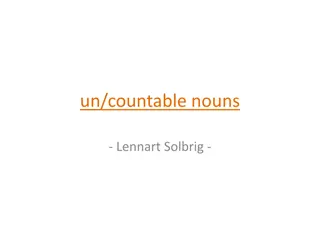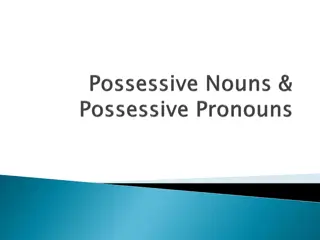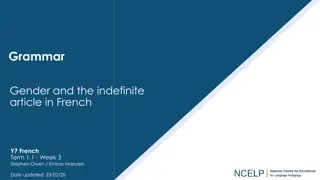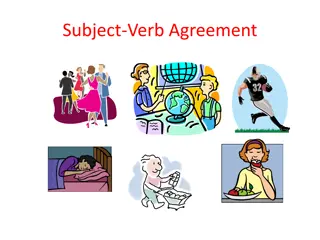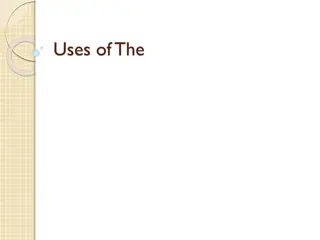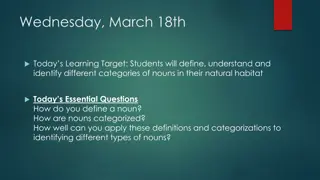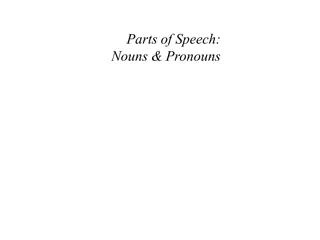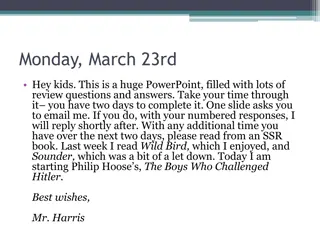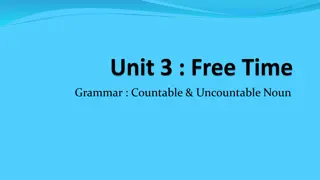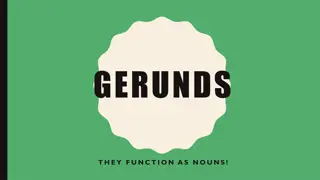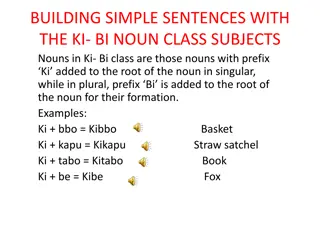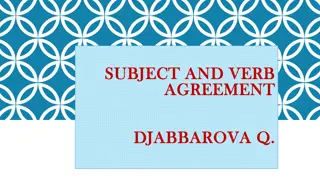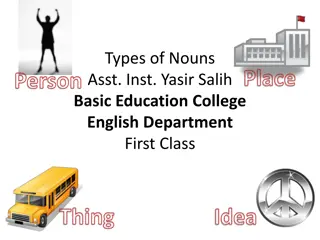Understanding Subject-Verb Agreement in English Sentences
Learn about subject-verb agreement in English sentences with singular and plural nouns, first, second, and third person examples, uncountable nouns, and exceptions where plural nouns take singular verbs. Discover how to match the verb form to the subject noun in different scenarios to ensure grammat
2 views • 17 slides
Demonstrative Pronouns: This, These, That, Those - Examples and Exercises
Learn about demonstrative pronouns "this," "these," "that," and "those" with examples and exercises for both singular and plural nouns. Explore how to correctly use these pronouns in sentences and strengthen your understanding through interactive questions. Practice identifying and differentiating b
1 views • 17 slides
Understanding Parts of Speech: Nouns and Pronouns Overview
Dive into the world of nouns and pronouns with this detailed guide covering definitions, examples, and practice exercises on common nouns, proper nouns, and different types of pronouns such as personal, demonstrative, and interrogative pronouns.
1 views • 19 slides
Understanding Adjectivals in Noun Phrases: A Comprehensive Guide
Adjectivals, including determiners, adjectives, and nouns, play crucial roles in modifying nouns within noun phrases. This guide explores the different types of adjectivals, their positions within a phrase, the use of pre-headword modifiers such as determiners, and the order of adjectives and nouns.
1 views • 40 slides
Learn Plural and Singular Forms with Animals in English
This lesson focuses on differentiating between plural and singular forms using animals as examples. Students will learn to write sentences using "They're" for plural and "It's a" for singular, while looking at pictures of various animals. By the end of the lesson, students will be confident in using
1 views • 6 slides
Understanding Proper Nouns: Names of People, Places, and Things
Proper nouns are special nouns that specify particular people, animals, or places. They always start with a capital letter and help identify specific entities. Examples include names of individuals such as Sami, Carol, or Elliot, as well as places like the National Orthodox School. Recognizing and c
0 views • 5 slides
Understanding Nouns: Types and Examples
This content delves into the different types of nouns, such as common and proper nouns, concrete and abstract nouns. It also provides examples and explanations on how nouns can be used in sentences. Gain insights on nouns as you explore this informative piece.
0 views • 24 slides
Understanding Singular Value Decomposition (SVD)
Singular Value Decomposition (SVD) is a powerful method for solving systems of linear equations or matrices that are singular or close to singular. When LU-decomposition or Gaussian elimination fail, SVD provides a stable matrix decomposition helpful in various applications. It is particularly usefu
0 views • 17 slides
Guidelines for Forming Singular and Plural Nouns
This collection provides clear guidelines for forming singular and plural nouns, including adding "-s", "-y endings, and "-ies". It also covers exceptions, proper nouns, and tips on pluralizing certain words. Learn when to add "-es", double consonants, or when a false pronunciation might occur.
0 views • 21 slides
Understanding Types of Nouns: Common, Proper, Concrete, and Abstract
This educational content delves into the different types of nouns, including common nouns that refer to general entities, proper nouns that denote specific names, concrete nouns that are tangible, and abstract nouns representing intangible ideas. Explore examples and classifications to enhance your
0 views • 14 slides
Understanding the Singular Value Decomposition
The Singular Value Decomposition (SVD) is a powerful factorization method for matrices, extending the concept of eigenvectors and eigenvalues to non-symmetric matrices. This decomposition allows any matrix to be expressed as the product of three matrices: two orthogonal matrices and a diagonal matri
0 views • 35 slides
Understanding Singular Value Decomposition and the Conjugate Gradient Method
Singular Value Decomposition (SVD) is a powerful method that decomposes a matrix into orthogonal matrices and diagonal matrices. It helps in understanding the range, rank, nullity, and goal of matrix transformations. The method involves decomposing a matrix into basis vectors that span its range, id
0 views • 21 slides
Understanding Singular and Plural Nouns
Learn the rules of singular and plural nouns, including regular and irregular forms. Discover how to form plurals with examples like adding -s, -es, -ies, or -es to words ending in specific letters like -s, -x, -z, -ch, -sh. Enhance your grammar skills with this comprehensive guide.
0 views • 10 slides
All About Nouns: Types, Rules, and Examples
Explore the world of nouns - words that name people, places, things, or ideas. Learn about singular/plural, common/proper, concrete/abstract nouns, possessive/collective nouns, and rules for making singular nouns plural with helpful examples.
1 views • 22 slides
Understanding Nouns and Abstract Nouns: Identification and Formation
Explore the world of nouns, including proper nouns and collective nouns. Learn to identify and correctly write proper nouns and match collective nouns with their respective groups. Discover abstract nouns and how to create them by adding "-ness" to words. Enhance your writing skills with these funda
0 views • 107 slides
Understanding Nouns: Types and Examples
Explore the concept of nouns, the basic building blocks of sentences, and learn about different categories such as common and proper nouns. Witness how nouns represent a wide range of things and enhance your communication skills by mastering various nouns in English.
0 views • 19 slides
Understanding Countable and Uncountable Nouns
Countable nouns have singular and plural forms and can be used with articles like "a" and "the," while uncountable nouns have only one form and cannot be quantified with numbers. Countable nouns can stand with numbers or articles, while uncountable nouns can be used with specific words like "some" o
0 views • 16 slides
Understanding Collective Nouns in Grammar
Exploring collective nouns, which refer to groups of people or things. Learn when to use singular or plural verbs with collective nouns. Examples like "jury," "team," "class," "couple," and "family" illustrate how sentence structure changes based on how the group is regarded. Enhance your grammar sk
0 views • 4 slides
Grammar Warm Ups Lessons 16-20: Parts of Speech - Nouns
Learn about nouns as parts of speech in Lessons 16-20 of the Grammar Warm Ups series. Explore the definition, examples, and identification of nouns, including common and proper nouns. Improve your grammar skills with exercises highlighting different types of nouns.
0 views • 11 slides
Understanding Possessive Nouns and Pronouns in English Grammar
Explore the usage of possessive nouns and pronouns in English grammar through examples of singular and plural possessive forms. Learn how possessive pronouns replace possessive nouns to indicate ownership effectively in sentences. Enhance your understanding of forming possessive constructions and ap
0 views • 10 slides
Understanding Parts of Speech in English Language
This content delves into various aspects of parts of speech in the English language, covering sentences, phrases, and clauses. It discusses the use of adjectives, nouns, pronouns, verbs, adverbs, prepositions, conjunctions, and interjections, providing examples and explanations. Additionally, it exp
0 views • 33 slides
Understanding Countable and Uncountable Nouns
Learn the difference between countable and uncountable nouns, how to identify them, and when to use "a" or "an" with countable nouns. Discover examples of countable and uncountable nouns and how to ask about quantities. Improve your English grammar knowledge to enhance your writing skills.
0 views • 13 slides
Gender and the Indefinite Article in French
In French, nouns have genders (masculine or feminine) and are accompanied by definite articles (un or une) based on their gender. Learning the gender of nouns is essential as it cannot be guessed from the meaning or appearance. The indefinite article "a" is represented by un for masculine nouns and
0 views • 12 slides
Understanding Singular and Plural Nouns
Singular and plural nouns can sometimes be confusing, but this guide clears up common misconceptions. Learn when to use plural nouns for singular items, how certain nouns can be singular or plural, and when to use singular or plural verbs with specific nouns like sports teams or companies. Recognize
0 views • 9 slides
Understanding Subject-Verb Agreement
Master the rules of subject-verb agreement for singular and plural subjects, irregular verbs like be, have, and do, and compound subjects. Learn how to match singular subjects with singular verbs and plural subjects with plural verbs, and understand verb forms for different scenarios. Explore exampl
0 views • 40 slides
Understanding Singular and Plural Indefinite Pronouns
Explore the difference between singular and plural indefinite pronouns with examples. Learn about singular indefinite pronouns like 'each' and 'nobody', plural ones such as 'several' and 'few', and those that can be both singular and plural like 'some' and 'all'.
0 views • 5 slides
Understanding Singular, Plural, and Possessive Nouns
Explore the basics of singular, plural, and possessive nouns with examples and guidelines on forming and using them correctly. Enhance your writing skills and grasp the concept of noun variations effortlessly.
0 views • 13 slides
Understanding Nouns: Types, Examples, and Usage
Exploring the concept of nouns, this content covers the definition of a noun, classifications such as material, compound, proper, common, abstract, and collective nouns. It also includes exercises on filling in blanks with appropriate nouns and distinguishing proper nouns from common nouns with exam
0 views • 18 slides
Proper Use of Articles in English Grammar
Understand the correct use of definite (the) and indefinite (a/an) articles with countable and uncountable nouns, singular or plural nouns, adjectives, nationality words, and specific expressions. Learn when to use "the" with singular countable nouns and adjectives, and discover examples for clarity
0 views • 24 slides
Understanding Nouns: Definitions, Categorization, and Examples
Explore the world of nouns by defining, categorizing, and identifying different types such as common, proper, and abstract nouns. Enhance your understanding through examples and practice exercises. Uncover the essence of nouns as they represent people, places, things, and ideas.
0 views • 20 slides
Understanding Nouns and Pronouns in Grammar
Explore the concept of nouns and pronouns in grammar through examples and explanations. Learn about the different types of nouns, such as singular, plural, and collective nouns. Discover how compound nouns are formed and their usage in sentences.
0 views • 42 slides
Understanding Nouns and Pronouns in Grammar
Dive into the world of nouns and pronouns with this comprehensive guide. Learn about different types of nouns such as concrete, abstract, collective, and compound nouns. Explore the distinction between common and proper nouns. Discover the role of pronouns as words that substitute for nouns, includi
0 views • 7 slides
Comprehensive Review Questions on Verbs and Nouns
Explore a detailed PowerPoint presentation filled with review questions and answers on verbs and nouns. Take your time to go through the slides and engage with essential questions about different types of verbs and nouns. Enhance your understanding of abstract nouns, pronouns, and collective nouns w
0 views • 37 slides
Understanding Countable and Uncountable Nouns in Grammar
Explore the differences between countable and uncountable nouns in grammar with examples. Learn how to form plural forms of countable nouns and understand the concept of uncountable nouns. Enhance your grammar skills by mastering the usage of articles and quantifiers with both types of nouns.
0 views • 80 slides
Understanding Nouns and Their Functions in Sentences
Gerunds function as nouns in sentences and can serve various roles such as subjects, direct objects, and predicate nouns. Nouns act as the subject of a sentence, telling who or what the sentence is about. By identifying the subject in sentences, you can understand its role and importance in conveyin
0 views • 22 slides
Constructing Sentences with Ki-Bi Noun Class
Learn how to form simple sentences using nouns in the Ki-Bi class. Discover how to create plural nouns and construct subject-predicate sentences with the appropriate prefixes. Explore examples and rules for transforming singular nouns into plural forms. Master the use of Ki and Bi prefixes for effec
0 views • 5 slides
Understanding Subject-Verb Agreement in Grammar
Learn about subject-verb agreement with singular and plural nouns, including examples and explanations. Explore how collective nouns impact verb usage, whether they are treated as singular or plural. Practice exercises provided for better understanding.
0 views • 15 slides
Understanding Singular and Plural Numbers in English Grammar
Explore the concept of singular and plural numbers in English grammar. Learn about the rules for converting singular nouns to plural, including adding "-s" and "-es" as suffixes. Discover exceptions to the rules and when to use them. Enhance your knowledge of English grammar with practical examples
0 views • 27 slides
Understanding Nouns in English Language
Nouns are words used to refer to people, animals, objects, substances, events, ideas, and feelings. This includes proper nouns which name specific entities and common nouns that represent general terms. Additionally, collective nouns denote groups of entities. Examples such as Ruma, Sopna, Dhaka, Lo
0 views • 16 slides
Understanding Different Types of Nouns in English Language
Explore the diverse world of nouns, including common vs. proper nouns, concrete vs. abstract nouns, and human vs. non-human nouns. Learn how to differentiate between them and understand their unique characteristics through visual examples and explanations.
0 views • 14 slides
